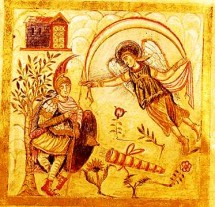The Aeneid

Virgil - A Roman Representation.
(by Virgil)
Iliad begat Aenid begat Commedia…Virgil links two classic works 2,000 years apart with a masterpiece of his own, wherein Aeneas goes to Rome and wreaks Trojan revenge on the successors of Attic Greece, with everyone satisfyingly getting what’s coming to them. Full of images and phrases resplendent either in English or in dodgy Latin.
Thus Walter Pater (in Appreciations) “I am reading over again the Aeneid, certain verses of which I repeat to myself to satiety. There are phrases there which stay in one’s head, by which I find myself beset, as with those musical airs which are for ever returning, and cause you pain, you love them so much[1]. I observe that I no longer laugh much, and am no longer depressed.” ([1] Earworm.)
Virgil should not be overlooked: he should be drilled into the heads of schoolchildren (for their own good, to cure their terrible mental stooping!) And should any educator object to or shirk this responsibility, they shall go to a place where the locals ausi mones immane nefas ausoque potiti (purpose dreadful deeds and get their way).
TVC recommends the modern translation by Robert Fitzgerald or the crusty, the fin-de-siècle (1890) rendering into English prose by John Conington, if you can’t find the Loeb 2 volume edition by Fairclough & Goold, that is.
The great conclusion, as rendered by Virgil (per Conington): “‘What, with my friend’s trophies upon you, would you escape my hand? It is Pallas, Pallas, who with this blow makes you his victim, and gluts his vengeance with your accursed blood.’ With these words, fierce as flame, he plunged the steel into the breast that lay before him. That other’s frame grows chill and motionless, and the soul, resenting its lot, flies groaningly to the shades.”
Leave a comment...
While your email address is required to post a comment, it will NOT be published.



2 Comments